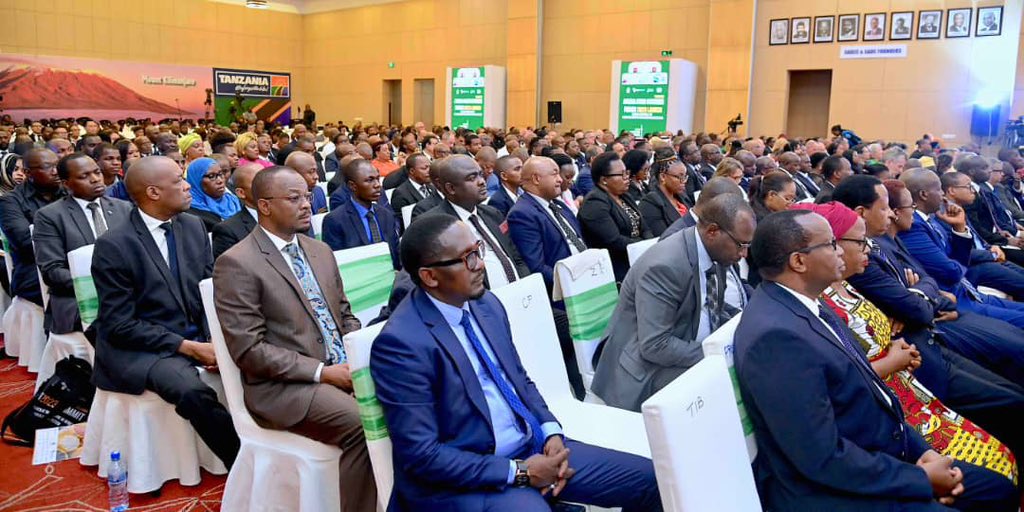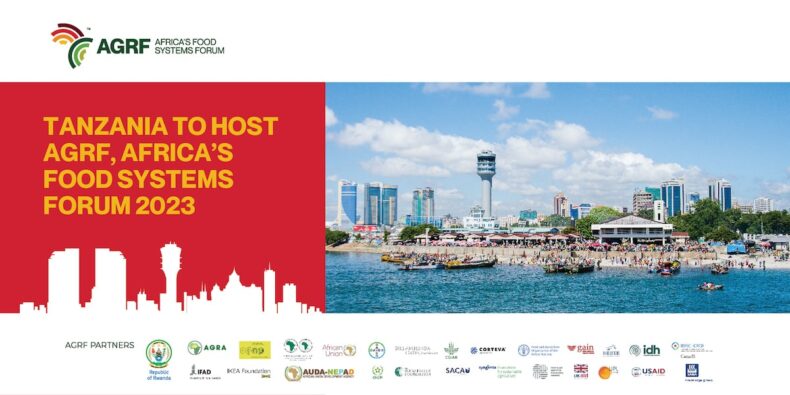
Dar es Salaam, Tanzania, 17th March 2023 – Her Excellency Dr. Samia Suluhu Hassan, President of the United Republic of Tanzania, has today officially launched Africa’s Food System Forum 2023, Africa’s premier platform for advancing the agriculture and food systems agenda on the continent, at State House, Tanzania.
The theme of this year’s Forum – Recover, Regenerate, Act: Africa’s Solutions to Food Systems Transformation – is anchored around building back better Food Systems and Food Sovereignty. It identifies three steps needed to achieve this transformation: Recovery: a call for decisive strategies and actions to help the continent recover and rebuild its food systems following multiple crises and shocks; Regenerate: which calls for the need to regenerate the natural resources, such as soil and water, which are essential for sustainable food production, and Act: which refers to the need to take urgent action to address food systems challenges, such as climate change, food waste, and food insecurity at only seven years before the 2030 SDG deadline.
The forum will spotlight the role of women and youth through a re-energized commitment in the food systems conversation, with a focus on regenerating interest in agriculture as a means of wealth creation for the continent.
Speaking at the launch in Dar es Salaam today, President Suluhu spotlighted the role of youth and women as critical to Africa’s food systems agenda.
Tanzania, as the host of this year’s forum, aims to become a food granary for Africa and the world in general. The country is actively working to create livelihoods for its people through various programs that prioritize the agricultural sector. Over 25 percent of Tanzania’s GDP relies on the agricultural sector, making it an essential pillar of the country’s economy.
In her remarks at the launch, President Suluhu stated, “The hosting of Africa’s Food System Forum 2023 is of importance to our nation where more than 25 percent of our GDP relies on the agricultural sector. For many years, Tanzania’s agriculture was based on subsistence farming. Today, the Government of Tanzania has intentionally made it a goal to prioritize this sector to create livelihoods for our people. We are doing this through various programs borne out of our hosting and learnings of the 2012 AGRF Summit and our focus on ensuring that the youth are a priority in investment and agricultural reform in our country. It is my hope that the hosting of this forum in our country is one step forward and a good start to achieving the results we expect in our agricultural sector.”

In addition, Tanzania is calling on the international community, partners of Africa’s Food Systems Forum, the private sector, and development partners to participate fully in the upcoming forum on the development of the agricultural sector to strengthen food systems in Africa.
The forum, which will take place from September 5th-8th, 2023 in Dar es Salaam, Tanzania, will be a vital platform to discuss practical actions and solutions to drive Africa’s food security forward and create better livelihoods for all. The summit will bring together a diverse group of stakeholders, including leaders, policymakers, scientists, heads of governments and private institutions, farmers, and youth.
The Chair of the Africa Food Systems Forum H.E. Hailemariam Dessalegn highlighted the importance of the continent moving beyond planning to curb food insecurity, to executing and actualizing commitments. He called for innovation, partnership, leadership, and home-grown solutions to respond to emergent agricultural and food systems challenges.
“Our challenges around the food system challenges will only get worse unless we work together to drive meaningful change. The difference between the Africa we seek to see and the Africa we shall become by 2060 is all dependent on the decisions we as leaders make and the supporting infrastructure.
In her speech, President Suluhu also highlighted the need to address the challenges faced by smallholder farmers, who form the backbone of Africa’s agriculture sector. She called for the creation of an enabling environment that would facilitate access to finance, inputs, markets, and technology to enhance their productivity and livelihoods.
The Forum will provide a platform for stakeholders to engage in dialogue and cooperation towards the achievement of food security and nutrition in Africa. It will focus on strengthening partnerships between governments, the private sector, civil society, and research institutions to create sustainable food systems that meet the needs of all Africans.
The Forum will also showcase innovative solutions and technologies that can be applied to improve food systems, including precision agriculture, digital farming, and agroecology. It will provide a platform for networking, knowledge sharing, and learning, with the goal of building a more resilient and sustainable agriculture sector in Africa.
Tanzania’s hosting of the Forum is a testament to the country’s commitment to agricultural development and food security. The country has implemented several initiatives aimed at enhancing productivity and creating an enabling environment for farmers, including the Kilimo Kwanza (Agriculture First) initiative, which aims to transform agriculture from subsistence to commercial farming.
The Forum will be an opportunity for Tanzania to showcase its progress in the agriculture sector and to learn from other African countries and international partners. It will provide a platform for sharing best practices and innovative solutions that can be replicated across the continent.
In conclusion, the Africa Food System Forum 2023 is a significant step towards achieving food security and nutrition in Africa. It provides a platform for stakeholders to engage in dialogue, share best practices and innovative solutions, and work together towards creating sustainable and resilient food systems that meet the needs of all Africans. The inclusion of youth and women in this dialogue is particularly critical, as they represent a significant proportion of the population and have a vital role to play in shaping the future of Africa’s food systems.


















